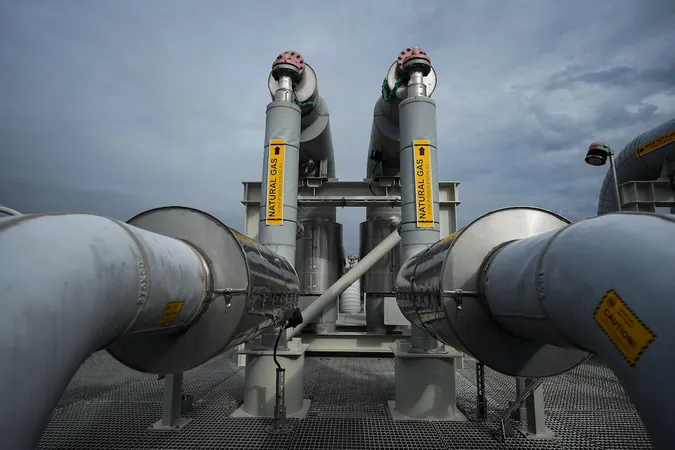
Canada Poised to Dominate LNG Market in Asia, Says TC Energy CEO
2025-04-10
Author: Benjamin
Canada's LNG Power Play
In a bold statement at a recent Canadian Club Toronto event, TC Energy's CEO, Francois Poirier, asserted that Canada could rise to become the foremost exporter of liquefied natural gas (LNG) to Asia. According to Poirier, the nation possesses the necessary supply, an advantage in transportation costs, and a lucrative market waiting to be tapped.
Political Will is Key
However, he emphasizes that achieving this ambitious goal hinges on concerted political leadership. Poirier urged Canadian leaders to unify and demonstrate to the world that Canada is ready to step back into the global energy arena.
Unlocking Asia's Lucrative Market
LNG, which is natural gas cooled to liquid form for easier transportation, presents a significant opportunity for Canada. Natural gas from Western Canada could fetch substantially higher prices in Asia compared to domestic markets in North America, thus positioning Canada as a competitive player while reducing reliance on U.S. markets.
First LNG Terminal in the Works
The gears are already in motion, as the initial phase of Canada’s first LNG export terminal is set to launch in Kitimat, B.C., with testing currently underway after a shipment of natural gas arrived. TC Energy is responsible for the Coastal GasLink pipeline, which is crucial for transporting this gas.
A Call for Bold Strategies
Poirier warns that Canada fell behind the U.S. in the competitive LNG race—a situation he believes can change with “big and bold” thinking from political leaders. Once at the forefront with 18 proposed LNG projects, Canada now finds itself in a catch-up game.
End the Reliance on the U.S.
At present, virtually all Canadian natural gas exports head to the United States, a relationship that has seen its share of turbulence due to political factors, including U.S. tariffs and political rhetoric.
Navigating Regulatory Challenges
Poirier calls for proactive political management to ensure timely and efficient project completion. He suggests that the upcoming federal election presents an opportunity for whichever party wins to collaborate closely with industry and Indigenous leaders on priority projects.
The Risks of Inaction
Moreover, he stresses the importance of policy consistency in project approvals, as the lengthy timelines in Canada—sometimes stretching to a decade—could jeopardize its competitive edge.
The Risks Ahead
Critics like Michael Sambasivam from Investors for Paris Compliance caution that the prevailing optimism surrounding LNG may be misplaced, suggesting that global LNG overcapacity, uncertainty in emerging markets, and high production costs could pose significant challenges.
A Collective Call to Action
In an open letter to federal leaders, Poirier and 13 other energy executives called for urgent political action to expedite important projects. Among their recommendations are streamlining regulations, enforcing strict deadlines for approvals, and removing emissions caps that hinder development.
The Energy Landscape Ahead
With the Conservatives advocating for decisive actions in line with the executives’ recommendations, and the Liberals proposing a single assessment office to speed up project approvals, Canada stands at a crucial juncture—one that could redefine its role in the global LNG arena.









 Brasil (PT)
Brasil (PT)
 Canada (EN)
Canada (EN)
 Chile (ES)
Chile (ES)
 Česko (CS)
Česko (CS)
 대한민국 (KO)
대한민국 (KO)
 España (ES)
España (ES)
 France (FR)
France (FR)
 Hong Kong (EN)
Hong Kong (EN)
 Italia (IT)
Italia (IT)
 日本 (JA)
日本 (JA)
 Magyarország (HU)
Magyarország (HU)
 Norge (NO)
Norge (NO)
 Polska (PL)
Polska (PL)
 Schweiz (DE)
Schweiz (DE)
 Singapore (EN)
Singapore (EN)
 Sverige (SV)
Sverige (SV)
 Suomi (FI)
Suomi (FI)
 Türkiye (TR)
Türkiye (TR)
 الإمارات العربية المتحدة (AR)
الإمارات العربية المتحدة (AR)